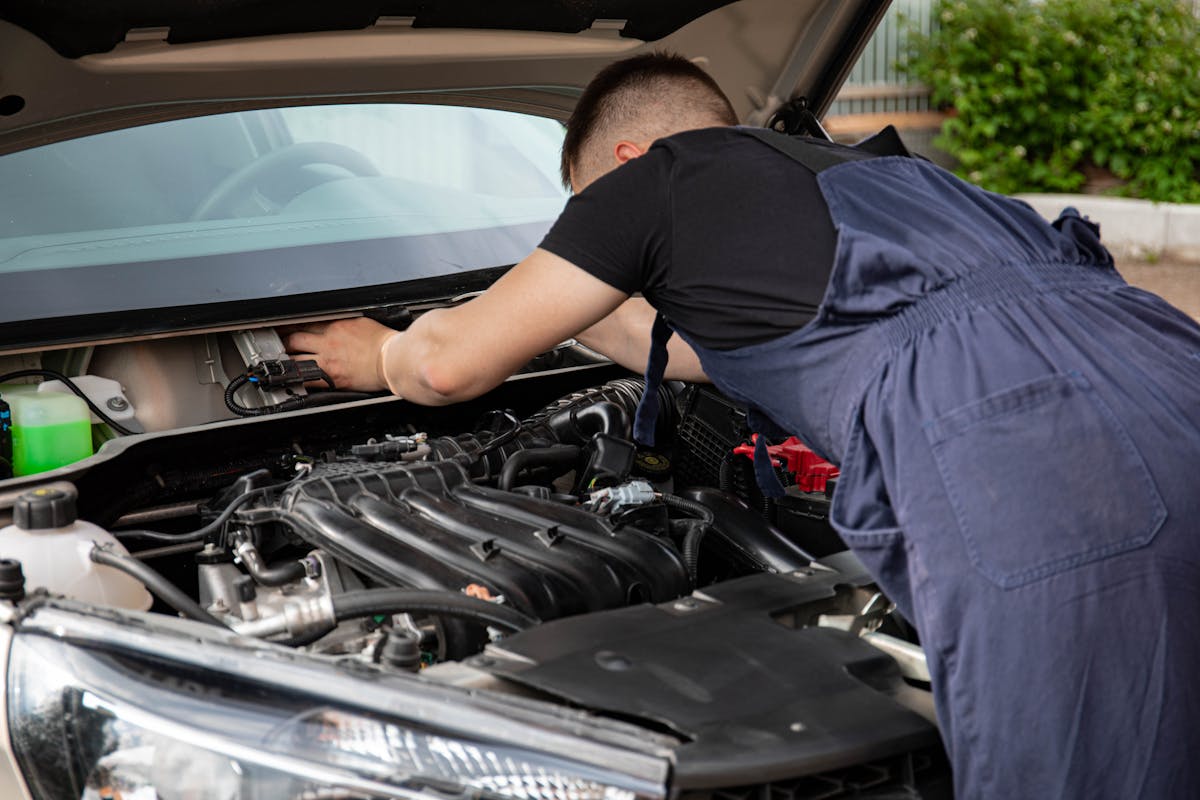What Causes Electrical Problems in Cars
In the domain of automobile operation and maintenance, understanding the root causes of electrical problems is paramount. From the battery to the alternator, starter motor, and electronic control unit, each component plays an integral role in a vehicle’s overall electrical system. The intricacies of these systems can lead to a multitude of potential issues, such as faulty connections, corrosion, short circuits, and component malfunctions. As we explore this topic further, we will shed light on these common problems, their implications, and the preventative measures that can be taken to guarantee smooth vehicular performance.
Understanding Car Electrical Systems
The intricacies of a car’s electrical system are often overlooked, yet they play a significant role in the vehicle’s overall functionality. The system is a complex network of wires, connections, and components that create, store and distribute electricity. It’s an important aspect that warrants a deeper understanding, particularly in regards to car grounding and voltage regulation.
Car grounding refers to the process of connecting the electrical system to the car’s frame, acting as a return path for electric current. It is an indispensable part of any electrical circuit, and in cars, it stabilizes voltage levels and protects against electrical faults. A poor or faulty ground connection can lead to various electrical issues, including erratic behaviour of the car’s electronics, or even failure to start.
On the other hand, voltage regulation is the system’s ability to maintain a constant voltage level. The alternator, the main generator of the car’s electricity, relies heavily on its voltage regulator to function properly. If this component malfunctions, it could lead to overcharging or undercharging of the battery, causing performance issues and potentially damaging the electrical system. As a result, maintaining proper grounding and voltage regulation is essential for the best performance of a car’s electrical system.
Battery Related Issues
Plunging into the domain of battery-related issues, it becomes apparent how vital the condition of the battery is in relation to a car’s electrical system. Battery maintenance is a fundamental aspect of ensuring ideal battery performance. This includes regular battery testing to evaluate its state of health, which can greatly extend the battery lifespan.
Faulty battery connections can lead to a myriad of electrical problems, often mistaken for more serious issues. Corrosion, loosening, or damage to the connections can impair the battery’s ability to effectively power the car’s electrical system. Regular battery cleaning can mitigate these issues, preventing the accumulation of corrosive materials and ensuring secure connections.
Battery replacement becomes necessary when the battery can no longer hold sufficient charge. This is typically after 3 to 5 years depending on the battery types and usage patterns. Regular testing can identify when replacement is imminent, allowing for timely action before complete failure, which can be detrimental.
Understanding the different battery types can also aid in diagnosing issues. For instance, lead-acid batteries might require different care and maintenance compared to AGM or Lithium-ion batteries. Hence, recognizing the specific conditions required for each type is essential in managing battery-related issues.
Alternator Faults
Shifting our focus to alternator faults, it is essential to first comprehend the functionality of an alternator in a car’s electrical system. By identifying the common signs of alternator issues, we can guarantee timely detection and prevention of further damage. Following detection, we will then explore the most effective solutions and strategies to rectify these faults.
Understanding Alternator Functions
Generating electricity as your car runs, the alternator plays an important role in powering everything from your headlights to your radio. It is fundamentally a generator that converts mechanical energy into electrical energy in the form of alternating current, hence the name.
To understand the importance of alternator maintenance, it is vital to grasp its functions. The alternator recharges the battery, compensating for the power used to start the car and operate the electrical accessories. Without the alternator continually replenishing the battery, it would quickly lose charge and leave the vehicle without the necessary power to function.
When it comes to alternator replacement, understanding its operation is key. The alternator comprises several parts: a rotor, a stator, a diode assembly, a voltage regulator, and a pulley. Each of these components can fail due to various reasons such as wear and tear, overheating, or voltage spikes, leading to a malfunctioning alternator.
Detecting Alternator Issues
In the domain of automobile mechanics, identifying potential alternator issues is a vital skill. When an alternator malfunctions, it can lead to a host of electrical problems in a vehicle, affecting its overall performance. Therefore, early detection is paramount to prevent further damage.
Alternator testing is an important part of this process. It involves checking the output voltage of the alternator under various load conditions. Typically, a properly functioning alternator should produce a voltage between 13.5 and 14.5 volts. Any deviation from this range can be indicative of impending alternator failure.
Voltage regulation is another key aspect in detecting alternator faults. It is the alternator’s function to maintain a steady voltage output despite changes in engine speed and electrical load. A failure in this function could mean the alternator is unable to supply the necessary electrical charge to power the vehicle’s systems, resulting in a myriad of electrical issues.
Identifying these irregularities in early stages is essential to mitigate the risk of complete alternator failure. A systematic approach to alternator testing and understanding of voltage regulation can aid in prompt detection and diagnosis of alternator issues, ensuring the longevity and reliability of the vehicle’s electrical system.
Solutions for Alternator Faults
Having explored the significance of diagnosing alternator issues, it is now appropriate to examine the range of solutions available for such faults. The primary remedy for alternator faults is alternator replacement. This involves the removal of the faulty alternator and its substitution with a new or refurbished one. It is a task that requires mechanical expertise due to the alternator’s intricate placement within the vehicle’s engine compartment.
An alternative to full replacement is the repair of specific alternator components. For instance, the voltage regulator, an integral part of the alternator that controls the amount of electricity supplied to the battery, can often be replaced independently. Ensuring proper voltage regulation is critical to maintaining the health of other electrical components in the car.
However, it is important to note that the decision between alternator repair and alternator replacement should be made based on a thorough diagnosis of the alternator condition, the overall health of the vehicle, and cost-effectiveness. While repairs may solve the immediate problem, replacement can often prevent future electrical issues, offering a more long-term solution. Consequently, understanding the cause and nature of the alternator fault is key to selecting the best solution.

Starter Motor Failures
Vehicle ignition issues, often stemming from starter motor failures, can be a significant cause of electrical problems in cars. Starter motor malfunctions are primarily due to wear and tear, poor maintenance, or inappropriate use. This critical component initiates the engine’s operation, and its failure can render a car immobile.
Different starter motor types have varying levels of susceptibility to failure. For instance, gear-reduction starters are generally more durable than direct-drive types. Hence, understanding the type of starter motor your vehicle uses can provide insight into potential issues and the required maintenance.
Proper starter motor maintenance is essential to prevent failures. It involves regular inspection for worn-out components, cleaning to prevent dirt accumulation, and timely replacements.
Here are some common indicators of starter motor failure: – Grinding noise during ignition, indicating worn-out gears – Frequent need for jump-starting the car – The starter motor remains on even after the engine has started – The car fails to start, and there’s a clicking sound
Issues With Wiring and Fuses
Shifting focus from starter motor failures, another common origin of electrical complications in cars lies within the domain of wiring and fuses. Wiring corrosion and fuse overload are two prevalent issues that greatly contribute to this problem.
The issues with wiring often stem from corrosion, which is the slow decay caused by exposure to moisture and oxygen. Wiring corrosion can lead to resistance in the electrical flow, reducing the efficiency of the current and causing system failures. It can also lead to shorts in the wiring, which can cause unpredictable behavior in the electrical system.
Fuses, on the other hand, are designed to protect the electrical circuits in the car by creating a point of failure where excess current can be safely diverted. However, if a fuse is subjected to overload, it can blow and interrupt the circuit it is protecting, causing a system failure. A fuse overload is typically the result of a short circuit or an overcurrent condition, where the current exceeds the fuse’s rated capacity.
With the complexity of modern car electrical systems, even minor issues with wiring or fuses can lead to considerable complications, requiring expert diagnosis and repair.
Ignition Switch Malfunctions
Ignition switch malfunctions are a prevalent source of electrical problems in vehicles, necessitating an extensive understanding for accurate diagnosis and repair. Our discussion will first consider the common issues associated with ignition switches, which can range from starter motor failures to unexpected stalling. We will then proceed to discuss the technical aspects of addressing and rectifying these malfunctions, providing detailed steps for effective troubleshooting and repair.
Common Ignition Switch Issues
The heart of a car’s start-up process, the ignition switch, can often become a source of trouble. Essential in ensuring the correct ignition timing and key recognition, its malfunction can lead to numerous problems, hindering the vehicle’s overall performance.
Several issues can plague the ignition switch, including:
- Worn-out key or ignition cylinder: Over time, the key or the ignition cylinder can wear down, leading to difficulty in turning the key or even a failure in key recognition.
- Faulty ignition switch contacts: The electrical contacts within the switch can deteriorate, causing intermittent or total loss of electrical power.
- Misaligned ignition timing: This can cause engine misfires or poor fuel economy, leading to decreased vehicle performance.
- Ignition switch overheating: Faulty wiring or a short circuit can cause the switch to overheat, potentially leading to an electrical fire.
Understanding these issues is essential in maintaining vehicular integrity. Ignition switch malfunctions can cause significant disruption, ranging from inconvenient start-up failures to dangerous situations. Therefore, regular inspection and immediate attention to any abnormalities are critical.
Fixing Ignition Malfunctions
In addressing ignition switch malfunctions, a methodical and systematic approach is essential. An ignition switch malfunction could manifest itself as a no-start condition or intermittent operation, which may be traced back to the ignition coil or timing.
The ignition coil, a high-voltage transformer made up of two coils of wire, is a vital component of the ignition system. It transforms the battery’s low voltage to the thousands of volts needed to create an electric spark in the spark plugs, igniting the fuel. A faulty ignition coil can cause a misfire, power loss, or a no-start condition. To resolve this, the coil should be tested for resistance using an ohmmeter, and if it’s not within the manufacturer’s specifications, it should be replaced.
Ignition timing, on the other hand, refers to the point at which the spark plugs fire, igniting the fuel-air mixture in the engine’s combustion chamber. Incorrect ignition timing can cause poor engine performance and a reduction in fuel efficiency. To fix this, a timing light is used to adjust the timing to the correct manufacturer’s specifications.
Faulty Spark Plugs
A significant number of electrical issues in vehicles can be traced back to faulty spark plugs. These components are crucial for ignition performance, as they ignite the fuel-air mixture in the engine’s combustion chamber, effectively starting the vehicle. When spark plugs become faulty, they can lead to a myriad of electrical problems, affecting overall vehicle operation and performance.
Proper spark plug maintenance is essential for maintaining ideal ignition performance. Faulty spark plugs can result in multiple issues, including:
- Poor fuel efficiency: A defective spark plug can disrupt the fuel-air mixture ignition, leading to increased fuel consumption.
- Uneven engine power: Spark plug issues can cause the engine to vibrate or jerk, indicating uneven power delivery.
- Difficulty starting the car: A common symptom of faulty spark plugs is trouble starting the car, as the plugs fail to ignite the fuel-air mixture properly.
- Increased emissions: Faulty spark plugs can cause incomplete combustion, leading to increased exhaust emissions.
Electronic Control Unit Problems
Car-related electrical issues often originate from problems with the Electronic Control Unit (ECU). A central processor in modern vehicles, the ECU, is responsible for managing and controlling the myriad of electrical systems and subsystems. This complexity, while providing essential features and functions, also opens the door to potential failure points.
ECU problems can manifest in several ways, such as erratic engine behavior, poor fuel economy, or even total vehicle shutdown. These are often traced back to faulty ECU diagnostics or outdated software. The ECU’s primary function is to receive, process, and respond to signals from sensors throughout the vehicle. If these diagnostic processes are compromised, the ECU may misinterpret sensor data, leading to inaccurate control signals and subsequent vehicle malfunctions.
Software updates serve as critical maintenance tasks for the ECU. As technology evolves, updates are regularly released to improve performance, fix bugs, or enhance features. Without these updates, the ECU may run on outdated algorithms, leading to suboptimal performance and potential issues.
Frequently Asked Questions
How Does Extreme Weather Impact a Cars Electrical System?
Extreme weather, particularly temperature extremes, can greatly impact a car’s electrical system. Increased humidity can cause corrosion, while extreme cold or heat can strain the battery and impair the performance of the electrical components.
Does Frequent Car Use Cause More Electrical Problems?
Frequent car use can potentially lead to more electrical issues, particularly if regular car maintenance is neglected. It can strain the battery, reducing its lifespan and triggering various electrical complications over time.
How Can I Prevent Electrical Issues in My Car?
Regular battery maintenance and consistent wiring inspections are key preventive measures against electrical issues in cars. Ensuring clean battery terminals and intact wiring can help avoid potential electrical malfunctions or system failures.
What Are the Signs of an Impending Electrical Failure in a Car?
Warning signs of impending electrical failure in a car include dimming lights, frequent fuse blowouts, and irregularities in electronic devices. Regular checks of battery health can predict and prevent such electrical issues efficiently.
Are Electrical Issues More Common in Certain Car Models?
Electrical issues can vary by model due to design differences. However, it’s not solely tied to specific models. Factors like maintenance, usage, and environment greatly affect a car’s electrical reliability more than its make.






